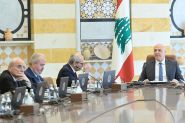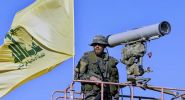
Several points stand out from US Special Envoy Morgan Ortagus’ security-focused tour in Lebanon on Sunday. The visit took place as Lebanon reaffirmed its state authority and its monopoly over arms. Ortagus attended a meeting of the Ceasefire Supervision Committee in Ras Naqoura alongside CENTCOM commander Admiral Brad Cooper.
Following an aerial survey of Lebanon’s south border region aboard a Lebanese Army helicopter, an agreement was reached to reactivate the mechanism responsible for monitoring ceasefire violations.
Sources close to the matter noted that this symbolic gesture both revives efforts after a long period of near inactivity and reinforces the principle that stability must be anchored within strengthened institutional frameworks.
Admiral Cooper pledged enhanced logistical and military support to the Lebanese Army, reaffirming the US’ commitment to regional stability. His visit to Israel the previous day, where he strengthened ties with senior military officials, highlighted the strategic importance of this trip. The engagement aimed not only to rhetorically support the army but also to bolster its practical deployment capabilities in a context where, according to diplomatic sources, “Washington is eager to achieve disarmament without indefinitely waiting.”
Lebanese authorities are counting on US pressure on Israel to facilitate the army’s full deployment in the south, as it currently controls more than 85% of the territory, according to military sources.
A Two-Pronged Approach
Ortagus’ visit came just two days after the Lebanese government approved the army’s plan. On Friday, the Cabinet endorsed the military institution’s roadmap, which calls for disarming all militias and ensuring the state’s monopoly over arms.
This decision builds on earlier measures taken on August 5 and 7 and extends the firm message from Washington. For the US, the removal of weapons from Hezbollah and all militias is a prerequisite for restoring state sovereignty and for the country’s recovery.
The decision has faced criticism from some political quarters. While certain parties lamented the absence of specific deadlines or described the decision as softened, many observers stressed that the content itself is what matters. The plan is now enforceable, with no possibility of reverting to previous conditions.
The joint Ortagus-Cooper visit illustrates a two-pronged approach, according to informed sources. One is diplomatic, legitimizing, and politically supporting the government’s roadmap. The other is military, preparing the practical tools for implementation on the ground.
Ortagus acted as the guarantor of a political narrative, promoting state building and the legitimacy of the army, while Cooper provided tangible military support for the plan.
Together, they reinforced the message that state sovereignty requires exclusive control over coercive power.
Sources note that Lebanon is at a pivotal moment, asserting state integrity while managing internal political balances and external geostrategic constraints.
Speaking to This is Beirut, journalist and political analyst Ali Hamade said that for Ortagus, the next step is returning to Washington to secure funding to assist the Lebanese Army in implementing its plan.
The goal is for the military to complete the first phase of its mission, covering the southern region of the Litani, within a few weeks. This will be achieved by providing all necessary logistical and financial support before moving to the remaining areas.
Hezbollah’s reaction remains a major variable. The group, through its secretary-general Naim Qassem, maintains that disarmament can only occur after Israel withdraws from the five strategic points it continues to occupy in southern Lebanon and after the launch of a national reconstruction process. Meanwhile, Hezbollah’s political council vice president, Mahmoud Comati, stresses a national security strategy, while some internal leaders reject any disarmament without compromise.
If the plan is quickly implemented and the army establishes effective control over areas historically under Hezbollah’s influence, its position will be tested.
This follows Monday morning’s meeting in Baabda between President Joseph Aoun and Parliament Speaker and Hezbollah ally Nabih Berri, who expressed strong optimism.
The coming weeks will be decisive, with only time, institutional resolve, and sustained external pressure determining the outcome.




Comments